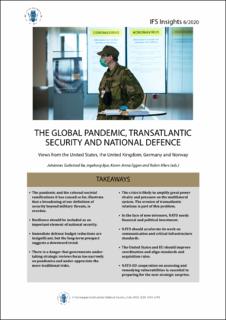| dc.contributor.editor | Rø, Johannes Gullestad | |
| dc.contributor.editor | Bjur, Ingeborg | |
| dc.contributor.editor | Eggen, Karen-Anna | |
| dc.contributor.editor | Allers, Robin | |
| dc.date.accessioned | 2020-06-19T09:23:03Z | |
| dc.date.available | 2020-06-19T09:23:03Z | |
| dc.date.issued | 2020 | |
| dc.identifier.issn | 1894-4795 | |
| dc.identifier.uri | https://hdl.handle.net/11250/2658796 | |
| dc.description.abstract | The pandemic and the colossal societal ramifications it has caused so far, illustrate that a broadening of our definition of security beyond military threats, is overdue.
Resilience should be included as an important element of national security.
Immediate defence budget reductions are insignificant, but the long-term prospect suggests a downward trend.
There is a danger that governments undertaking strategic reviews focus too narrowly on pandemics and under-appreciate the more traditional risks.
The crisis is likely to amplify great power rivalry and pressure on the multilateral system. The erosion of transatlantic relations is part of this problem.
In the face of new stressors, NATO needs financial and political investment.
NATO should accelerate its work on communication and critical infrastructure standards.
The United States and EU should improve coordination and align standards and acquisition rules.
NATO-EU cooperation on assessing and remedying vulnerabilities is essential in preparing for the next strategic surprise. | en_US |
| dc.language.iso | eng | en_US |
| dc.relation.ispartofseries | IFS Insights;6/2020 | |
| dc.title | The global pandemic, transatlantic security and national defence. Views from the United States, the United Kingdom, Germany and Norway | en_US |
| dc.type | Report | en_US |
| dc.source.pagenumber | 24 | en_US |
